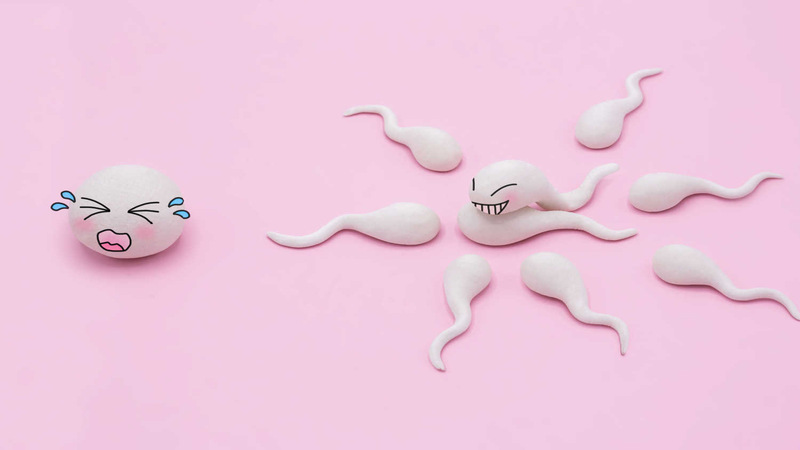
Did you know fertility problems need not be some issue with either of the partners and can be just due to the interaction between the sperm and the cervical mucus? Yes, it is a general assumption that if a couple is unable to conceive after trying for even a few months, one of the partners must be having a fertility issue. In reality, there is more to fertility issues that can go beyond both partners too. Post-coital test for infertility is one of the tests that helps check for the ability of sperm and egg to fertilize.
Are you and your partner trying to conceive but are facing some roadblocks? Before you can decide to opt for any fertility treatments, you need to take a set of fertility tests. These tests will help you understand if there is a problem and what it is. Have you heard of the post-coital test? Read on to know all about this fertility test and how it can help you.
What is Post-Coital Test For Infertility?
Also known as a Sims test and a Huhner test, the post-coital test is a fertility test to examine the interaction between a male’s sperm and a female’s cervical mucus. The cervical mucus must allow the sperm to travel up the vagina and through the fallopian tubes to meet the egg. If the sperm is unable to survive in the cervical mucus, it cannot enter the female reproductive system and meet the egg. As a result, the couple cannot conceive despite healthy eggs and sperm.
Why is Post-Coital Testing Done?

When tests reveal there are sufficient eggs and sperm motility is also good, a post-coital test for infertility is recommended to rule out cervical abnormalities. If the female is ovulating properly and the semen analysis shows no issues, the test can check if the interaction between the two is good.
If the sperm is unable to survive in the cervical mucus long enough to enter the female’s reproductive system, pregnancy cannot occur. By ruling out abnormalities in the cervical mucus or after ensuring the interaction between the two is okay, the doctors can start analyzing from other angles.
What Does Post-Coital Test For Infertility Evaluate?
The post-coital test checks the viability of the male sperm in the female cervical mucus. The Huhner test is one of a kind that checks this crucial interaction between the fluids. The test helps understand if the cervical mucus interacts well with the sperm, protects it during ovulation, and helps it travel up the fallopian tube, to increase the chances of pregnancy.
When is the Post-Coital Testing Done?
A post-coital test cannot be a substitute for other fertility tests. It has to be a part of the fertility assessment. Once the semen analysis and pelvic scan show there are no issues with the semen and the woman has enough eggs to reproduce, this test can be taken.
The test is usually done before ovulation and within hours of sexual activity. When a woman wants to take this test, her menstrual cycle is closely tracked. Tracking the cycle helps determine when her ovulation is likely to occur. The doctor will then advise the couple to have unprotected sex just before ovulation time.
The test should be taken within 2 to 6 hours of sexual activity. Though the cervical mucus can protect the sperm and help it live even up to 5 days inside the female reproductive system, you need to take the test within a few hours for more accurate results. So if you were to take the test 8 hours after having sex, it becomes invalid.
How is Post-Coital Test Done?

A post-coital test is only for the female partner. It is generally carried out in the following manner.
- The female partner should take the test within a maximum of 8 hours after having sex.
- The doctor will conduct a physical exam using a speculum.
- Next, a small sample of cervical mucus is collected for testing.
- In many cases, a pelvic ultrasound is also taken to ensure the woman is about to ovulate.
- In the lab, the technician will analyze the cervical mucus under a microscope to check the quality of both the cervical mucus and the sperm motility in the cervical mucus.
- The test results can vary from lab to lab as the test is not standardized. The timing, and technique of conducting the test can vary from facility to facility. So, you may get different results from different clinics
How to Prepare For Post-Coital Test?
If you are planning to take a post-coital test, follow these steps
- Start tracking your menstrual cycle. You need to have sexual intercourse with your partner a day or two before you ovulate.
- Calculate your ovulation dates using traditional methods or ovulation kits for more precision.
- Meet your doctor before you ovulate and find out when they recommend sexual intercourse
- Fix an appointment according to the date and time the doctor gives regarding your ovulation
- Do not use any type of lubrication
- Do not wash after having sex
- Get to the clinic or hospital and ensure the test is taken within 8 hours of having sexual intercourse.
Interpreting Post-Coital Test Results
Since the test is not standardized, the test results can vary from clinic to clinic. The number of hours given between sexual intercourse and the test, the technique used to check the mucus, also varies from clinic to clinic. As a result, there are no standard steps to follow and the results are not considered very reliable.
On average, if they can spot at least five motile sperms in the sample mucus collected, the PCT result is considered normal.
On the other hand, if they can’t spot any motile sperm in the sample, then it means the vagina is a hostile environment that does not allow sperm to survive.
Are There Any Risks to Getting Post-Coital Test Done?
There are no known risks to getting the post-coital test done. This test is a very quick and non-painful procedure. The doctor will take a sample of the cervical mucus without injecting or hurting you in any way.
When to Consult the Doctor?

If you and your partner have been trying to conceive for a while now, it is important to visit a fertility specialist. They will help you identify the problem or reason behind your unsuccessful attempts. If the semen analysis and AMH results come back normal, you need to check the interaction of both partners’ fluids. Your doctor will guide you about which test to take and when.
A post-coital test is not in regular practice anymore. Though it was always taken as a part of other fertility tests, the lack of standardized tests or levels made it very difficult to conclude from these results. Many doctors dropped this test as the test only cost money for the couple but did not help improve their fight against infertility.
FAQ’s
1. What Day is the Post-Coital Test Done?
A post-coital test is performed within 24 hours of ovulation and within 2-6 hours after sexual intercourse. So, a couple is asked to have sexual intercourse just before ovulation and the test is performed the same day within hours.
2. How is a Post-Coital Test Performed?
A post-coital test is performed within 24 hours of ovulation and within 2-6 hours after sexual intercourse. So, a couple is asked to have sexual intercourse just before ovulation and the test is performed the same day within hours.
3. Can I Get Pregnant if My Post-Coital Test is Normal?
A post-coital test only checks the interaction between the sperm and cervical mucus. It is not a fertility treatment but just a test to help determine the next course of action. It cannot lead to pregnancy.
